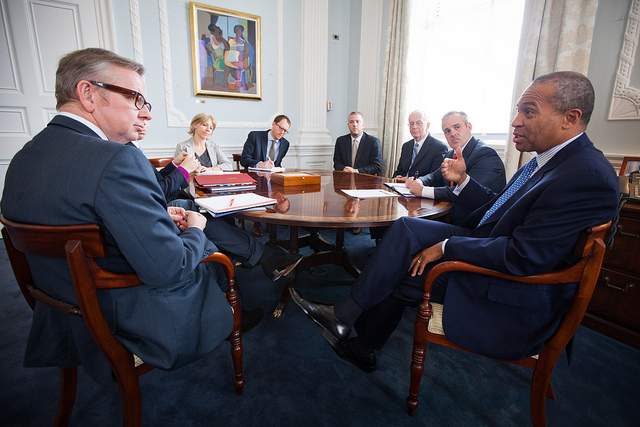Appointments to public bodies are fraught with issues regarding executive control, politicisation and ministerial accountability
The recent row triggered by the decision of Michael Gove to not re-appoint the Labour Peer Baroness Morgan to a second term as the Chair of Ofsted has been subject to severe criticism, with many observers suggesting that it marks the latest instalment in a systematic purge of non-Conservative figures who head public bodies. In assessing the politics of ministerial appointments and reappointments, Felicity Matthews and Marc Geddes show that appointments to public bodies are fraught with issues regarding executive control, politicisation and ministerial accountability
On 30 January 2014, The Independent revealed that Michael Gove would not re-appoint Baroness Sally Morgan for a second term as the chief executive of Ofsted. On the next morning’s Today Programme, Baroness Morgan claimed that:
I am the latest of a fairly long list of people now who are non-Conservative supporters who are not being re-appointed. I think there is absolutely a pattern. It’s extremely worrying.
The media seized on the issue, and whilst Michael Gove has defended his decision in the language of renewal and ‘bringing a new pair of eyes to bear’, speculation has been rife regarding the real reasons for the non-renewal of Lady Morgan’s contract. Moreover, many of those close to both Ofsted and Secretary of State have expressed grave concerns. In evidence to the Education Select Committee, the Chief Inspector of Schools Sir Michael Wilshaw, was vehement in his defence of the outgoing Chair and described how he asked Gove to reconsider his decision; and sources close to David Laws, Gove’s own Schools Minister, have suggested that he is ‘absolutely furious’ at the attempt to ‘politicise’ Ofsted.
The extent to which public appointments have been subject to increasing politicisation under the Coalition remains a moot point. The increased regulation of appointments by the Office of the Commissioner for Public Appointments, and the introduction of additional layers of pre-appointment scrutiny by select committees, are intended to ensure transparency and probity. Indeed Baroness Morgan’s position is one that falls under the direct remit of OCPA. However, whilst appointments are subject to such regulatory forces, re-appointments (and non-renewals) remain a matter of ministerial discretion; and in a recent press release, the Commissioner for Public Appointments reiterated that he ‘plays no part in a decision not to re-appoint someone at the end of their term of office. That is a matter for Government.’ Critics have highlighted the removal of other Labour-supporting peers from similar high-profile positions as evidence of politicisation, including Dame Liz Forgan as Chair of the Arts Council and Dame Suzi Leather as Chair of the Charities Commission. Yet, the Government has also declined to re-appoint ostensibly Conservative-supporting chairs of public bodies, including Andrew Sells as Chair of Natural England, David Prior as Chair of the Care Quality Commission, and Lady Hanham as interim Chair of Monitor.
There is little evidence to suggest that, in declining to re-appoint Baroness Morgan, the Secretary of State acted inappropriately or exceeded his prerogative powers of appointment. Yet, the furore that surrounds this case underlines popular (mis)conceptions regarding the untrammelled exercise of ministerial patronage and its nefarious underlying motivations of reward and favour. The reality is far different, and across great swathes of public life, successive governments have voluntarily ceded or placed limits on their key powers of appointment. Indeed, this has gathered pace under the Coalition, reflecting the commitment within the Programme for Government to ‘strengthen the powers of select committees to scrutinise major public appointments’; and as a result a range of measures have been introduced, including the extension of pre-appointment scrutiny and the greater involvement of parliamentarians in actually making appointments. Moreover, evidence suggests that the ‘colonisation of the state’ that was so apparent up until the early 1990s is no longer a significant issue. All appointees are required to declare all political activity, and figures from OCPA reveal that in 2012-13, only 9 percent of those appointed declared some form of activity; which constitutes a marked decline from the 13 percent who declared some form of activity in 2011-12.
However, the majority of empirical analysis and scholarly research to date has focused on ministerial appointments; and the furore surrounding this case also reveals the way in which appointments and dismissals to public bodies are fraught with issues regarding executive control, politicisation and ministerial accountability. OCPA’s statistics reveal that whilst the majority of appointments made are new appointments, around 44 percent are reappointments (and around 41 percent of Chair appointments are reappointments). Yet despite constituting a significant proportion of appointments made each year, the vast majority of re-appointments escape scrutiny and remain a matter of ministerial discretion; and whilst the desirability of their regulation is obviously a matter of normative concern, at the very least this highlights a further dimension of inconsistency within an already confused regulatory landscape.
In September 2010 the Chancellor of the Exchequer announced his intention to implement a system of ‘double-locking’ for appointments to the Office for Budget Responsibility whereby the appointment and dismissal of senior staff could only proceed with the joint approval of government and parliament. Our research on the politics of public appointments has revealed the way in which such changes spill over and stimulate demands for similar reforms elsewhere, and the potential therefore exists that this ‘double-locking’ will prompt calls for further limits on ministerial powers of re-appointment. Our research also reveals the importance of critical events in driving such change, from the accusations of cronyism that led to the creation of OCPA, to the fallout of the MPs’ expenses scandal that prompted pledges to ‘clean up’ politics through such measures as pre-appointment scrutiny.
Political horoscoping is an activity fraught with the risk of getting it hideously wrong. Nonetheless, we will be bold, and it is our contention that a similar critical event looms on the horizon, as political speculation gathers pace regarding the future of the Environment Agency, and its Chair Lord Chris Smith in particular. Whilst Lord Smith is set to retire in June, the Chair colourfully described by the Conservative MP for Bridgewater and West Somerset Ian Liddell-Grainger as ‘a coward’ and ‘a little git’, may find his position untenable under sustained political pressure. In the event that he is pushed, questions regarding the way in which re-appointments and dismissals are made and scrutinised may become too loud to ignore.
—
Note: this post represents the views of the authors and not those of Democratic Audit or the LSE. Please read our comments policy before posting. The shortened URL for this post is: https://buff.ly/1gunhlB
—
 Felicity Matthews is a Senior Lecturer in the Department of Politics at the University of Sheffield. Her research interests encompasses a number of areas, including: government, governance and state capacity; constitutional reform; political leadership; policy design, implementation and service delivery; crisis management; and, citizen expectations and engagement.
Felicity Matthews is a Senior Lecturer in the Department of Politics at the University of Sheffield. Her research interests encompasses a number of areas, including: government, governance and state capacity; constitutional reform; political leadership; policy design, implementation and service delivery; crisis management; and, citizen expectations and engagement.
 Marc Geddes is a doctoral student in the Department of Politics at the University of Sheffield. His doctoral thesis contributes to the extensive literature on the relationship between parliament and government, principally by exploring the effect of parliamentary oversight of public appointments on parliamentary-executive relationships
Marc Geddes is a doctoral student in the Department of Politics at the University of Sheffield. His doctoral thesis contributes to the extensive literature on the relationship between parliament and government, principally by exploring the effect of parliamentary oversight of public appointments on parliamentary-executive relationships






 Democratic Audit's core funding is provided by the Joseph Rowntree Charitable Trust. Additional funding is provided by the London School of Economics.
Democratic Audit's core funding is provided by the Joseph Rowntree Charitable Trust. Additional funding is provided by the London School of Economics.
Appointments to public bodies are fraught with multiple issues https://t.co/d69spUCN3Z
Appointments to public bodies are fraught with issues regarding executive control, politicisation and ministeria… https://t.co/RmwKFhsL27
Appointments to public bodies raise key issues of executive control, politicisation and ministerial accountability https://t.co/yTzAqbn4LS
Are re-appointments to quangos such as Ofsted really politicised? And if so, what next? https://t.co/GDZCLd668S #Democraticaudit #Patronage
‘Appointments to public bodies are fraught with issues regarding exec control…’ by @DrFlissMatthews & @marcgeddes https://t.co/IWUQz2s3zt
‘Appointments to public bodies are fraught with issues regarding exec control…’ by Dr F Matthews and @marcgeddes https://t.co/ihmKuU5r2R
Quango appointments such as the Ofsted affair are fraught with issues https://t.co/SlsqMJE02Z
Felicity Matthews and I have written about the recent #publicappointments furore in the media: https://t.co/w49G4uZyOm #patronage #governance
Appointments to public bodies are fraught with issues regarding executive control, politicisation and ministerial… https://t.co/y2KvivQiKb